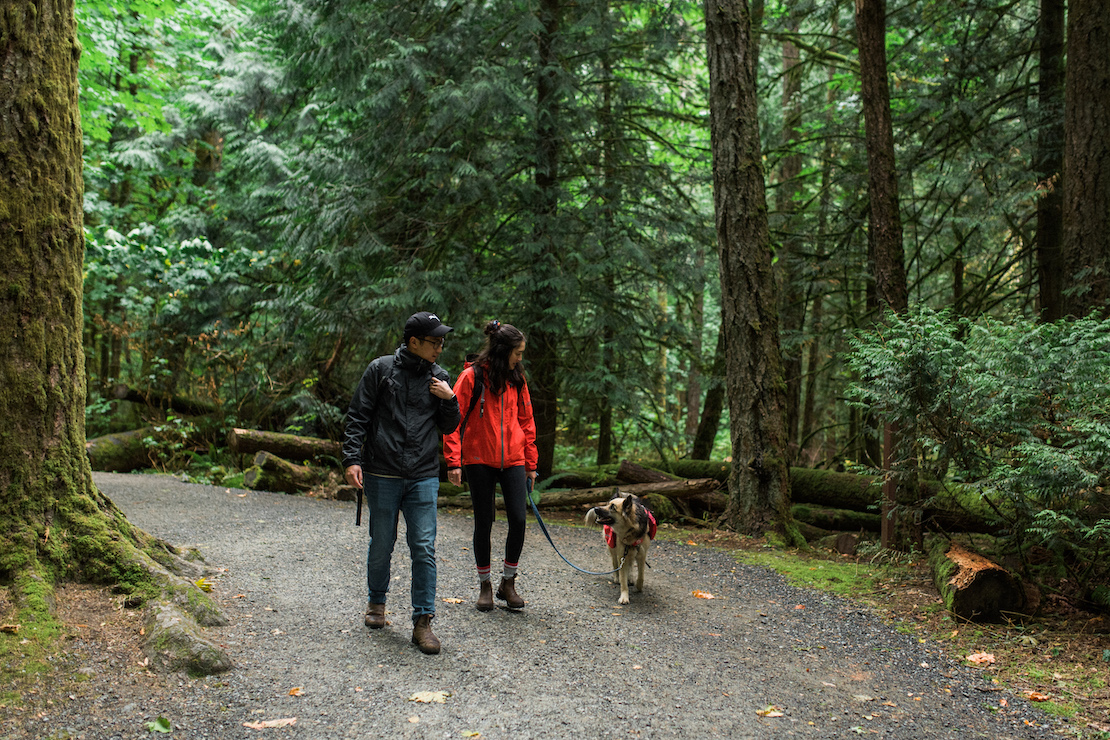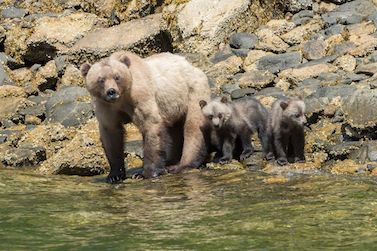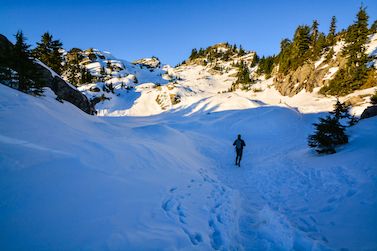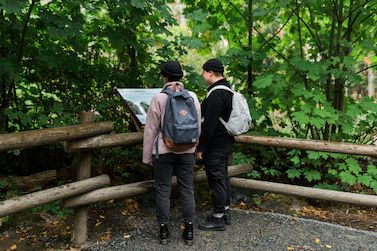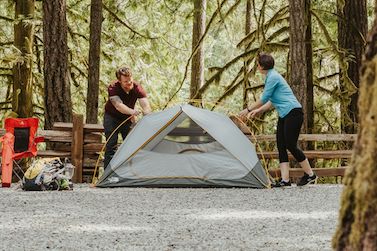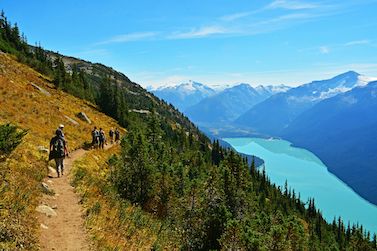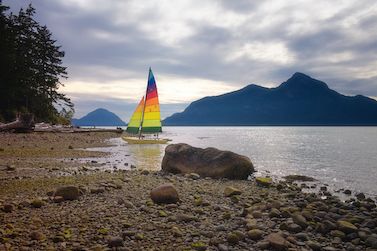At BC Parks, a big part of our job is helping people enjoy British Columbia’s extraordinary natural beauty. We are committed to protecting and stewarding B.C.’s natural spaces, so everyone can keep enjoying them for years to come.
We cannot do it without your help. That is why we’ve created guidelines for responsible recreation. Follow the guidelines on this page and do your bit to help us keep BC Parks clean, green, and serene.
This page provides information relevant to both frontcountry and backcountry areas. We use ‘frontcountry’ to mean any area within 1 km of a highway or park road. We use ‘backcountry’ to mean any area outside the frontcountry.
The guidelines presented below are grounded in the knowledge that the natural spaces of B.C. are First Nations territories.
Protecting what is now known as British Columbia starts with respecting Indigenous rights and connection to the land.
Look on this page for information about:
- Showing respect for Indigenous Peoples and cultural values
- Following Leave No Trace outdoor ethics
- Hiking safely, respectfully, and responsibly
- Taking care with campfires to prevent wildfires
- Keeping parks quiet and peaceful
- Disposing of waste properly
- Visiting BC Parks with pets
- Preserving the fresh air
- Being wildlife aware
- Visiting with drones
- Using off-road vehicles
For detailed information about keeping yourself, your family, and other visitors safe while visiting BC Parks, see the staying safe page.
Respect and reconciliation
Responsible recreation is grounded in respect for the land’s cultural values and First Nations’ relationship to the land. First Nations continue to steward the lands and waters that draw visitors here from around the world.
When visiting a BC Park, please remember you are on First Nations territories. Check the First Peoples’ Cultural Council map of B.C. to learn about whose territory you are visiting.
First Nations people use parks and protected areas for important cultural and social activities, including hunting, fishing, gathering, and ceremonies. Please allow space for First Nations people as they take part in these and other activities.
Archaeological sites are protected under the Heritage Conservation Act and must not be disturbed. If you find anything that could be an artifact, cultural belonging, or archaeological site, leave everything in place.
Report finding an archaeological artifact to the Government of BC’s archaeology branch and contact BC Parks. Visit the BC Government’s website to learn more about archaeology in B.C.
When visiting remote areas, remember that roads can be challenging and health and emergency services are not easily available. Take extra precautions so you do not burden local services, which are essential to community members.
To learn about how we are contributing to reconciliation with First Nations, see the Indigenous relations and reconciliation page.
Leave No Trace ethics
We ask all visitors to follow Leave No Trace outdoor ethics when visiting BC Parks. Take care to minimize your impact on the environment and leave everything as you find it. For more information on outdoor ethics, visit Leave No Trace Canada.
Removing anything from a BC Park is usually illegal. Only First Nations and special permit holders have permission to harvest or gather certain items. Do not remove mushrooms, berries, flowers, fossils, wood, shells, or cultural artifacts.
Responsible day-hiking
This short video features some great tips on how to prepare for a responsible day-hike in a BC Park.
For more information about responsible recreation on day-hiking trails, see our camping and day-use guide. For information on how to stay safe and protect the environment on a multi-day hike, see our backcountry guide.
Campfire safety
With wildfire risk growing in B.C., campfires are usually only allowed in designated fire pits. Temporary bans are becoming more common. Use our find a park tool to check the park’s webpage before visiting, to see if there is a campfire ban.
Campfires are generally not allowed in the backcountry (any area more than 1 km from a highway or park road). Fires are allowed on beaches only where fire pits are provided by BC Parks.
To help prevent wildfires, never leave your campfire unattended. Make sure it is completely out before you leave. Sift the cold ashes through your hands to ensure the fire is 100 percent extinguished.
Do not gather wood, break off branches, or damage live trees in any way to build your fire. You can bring your own locally sourced firewood or, in some cases, buy wood from the park operator.
Bringing firewood from outside the area can expose sensitive ecosystems to invasive species. Please only use locally bought firewood. For more information, see the Invasive Species Council of BC’s buy local burn local instructions.
For more important information on fire safety, see the prevent wildfires section of our camping and day-use guide.
Peace and quiet
Remember, people come to parks to experience the peace and calm of the natural world. Also, noise disturbs wildlife and makes it harder for animals to coexist with humans. Deliberate or unnecessary noise, such as loud music, is not allowed in BC Parks at any time.
Hiking
When hiking, remember trails are shared spaces. Be considerate of wildlife and other visitors. Talk quietly with the rest of your party and acknowledge people you meet along the trail.
Camping
When staying at a campground, observe quiet time between 11 pm and 7 am, unless other quiet times are specified. For information on quiet time at the campground you are visiting, use our find a park tool to check the park’s webpage.
Generators
When camping, keep the use of fuel-based electrical generators to a minimum. Use is only allowed from 9 am to 11 am and 6 pm to 8 pm. We encourage you to use quiet inverter generators instead of conventional generators.
Wherever possible, use electrified campsites, portable power stations, and solar generators to meet your power needs. You may use a portable power station or solar generator at any time of day.
You can see a list of parks with electrified sites, using our find a park tool. Simply select ‘electrical hook-ups’ under ‘facilities’ in the left-hand column.
Waste disposal
If garbage and other waste is not disposed of properly, it can harm the environment and wildlife. If wild animals get used to eating human food and garbage, it may lead to dangerous conflicts with people.
Use the recycling, garbage, and wastewater disposal facilities provided, whenever available. If these are not available, pack out your waste. Take all food scraps, hazardous materials, and anything left over from cooking, eating, and washing up.
If you have items that cannot be recycled at the park but can be elsewhere, please pack them out. For example, parks cannot recycle soft plastics, but some stores and recycling depots can.
Use public washrooms where available. In areas with no facilities, urinate away from vegetation and water. Pack out used toilet paper with garbage. Bury human waste at least 20 cm deep and 70 m from any water source.
Pet etiquette
Pets are welcome in many parks, but they are not allowed in playgrounds or public buildings. In most places, they must be leashed. Some parks include off-leash areas. Off-leash pets must be kept under control.
Leashing your dog keeps you, them, and wildlife safe. Letting your dog off leash outside designated areas can damage trails and natural resources, and harm sensitive wildlife. It may also endanger or upset other park visitors.
Please keep an eye out for signs regarding on- and off-leash areas and observe the rules strictly. If everyone follows these rules, there will continue to be plenty of pet-friendly spaces in BC Parks.
For information on keeping your pets, and yourself, safe around wildlife, see the wildlife section.
Fresh air
People come to the great outdoors expecting fresh air. At BC Parks, we are committed to making sure they are not disappointed. We’re doing everything we can to reduce your exposure to second-hand smoke and other airborne impurities.
Smoking tobacco or cannabis, using e-cigarettes, and vaping are not allowed in most areas. At some frontcountry campgrounds, campers can smoke at their registered campsites.
Even in frontcountry campgrounds, smoking and vaping may be banned due to fire risk. Smoking and vaping are not allowed anywhere in the backcountry. This includes access points such as park roads, parking lots, and trailheads.
Remember, there are also very strict rules about lighting campfires in the backcountry. For more information on campfire rules and regulations, see the campfire safety section of this page.
Wildlife
If you see wildlife, observe it from a distance. Do not follow or approach animals. Be especially considerate of wildlife and their habitats during sensitive times, such as when they are mating, nesting, raising young, or hibernating.
During these times, BC Parks may close certain areas to the public. Before visiting a park, use our find a park tool to view its webpage. Check the advisories for the latest information on closures.
Never feed wildlife or allow them to access human food and garbage, as this puts their lives at risk. It damages their health, alters natural behaviours, and exposes them to predators and other dangers.
Wild animals who have eaten human food and garbage may lose their natural fear of humans. This can make them aggressive and dangerous. For more details of how to avoid dangerous encounters with animals, see the wildlife safety page.
Drones
Operating drones without permission is strictly illegal in all BC Parks. We appreciate drones may be useful in resource management and scientific studies, but we rarely grant permission for drone use.
Drone use causes noise pollution, disturbs wildlife, and can invade the privacy of other park users. It may also disrupt emergency activities, putting wildlife, park visitors, and BC Parks staff at significant additional risk.
If you do get permission to fly a drone, you are still required to keep it away from wildlife and other visitors. You must also be ready to show BC Parks staff proof of permission whenever flying a drone in any park.
Off-road vehicles
Off-road vehicles (ORVs) are becoming increasingly popular throughout British Columbia. However, they are not allowed in most BC Parks and usually cannot be driven on park roads.
At some parks, you can use an ORV in certain areas. This can include park roads and designated off-roading areas, depending on the park and the type of vehicle you have. Types of ORVs include:
- All-terrain vehicles (also known as ATVs or quad bikes)
- Side-by-sides (such as Argos, Rhinos, or Razors)
- Snowmobiles
Any vehicle driven on a park road must be licensed and insured under the Motor Vehicle Act. Snowmobiles are never allowed on park roads. They may only be used in designated areas within certain parks.
Before visiting a BC Park, please familiarize yourself with the Government of BC’s ORV safety requirements. You can find these requirements, and other important information, on the BC Government’s off-road vehicles webpage.
For details of ORV policies in a specific BC Park, use our find a park tool to check the park’s webpage. When you arrive at the park, check signs for more information on rules and areas where ORVs are allowed.
